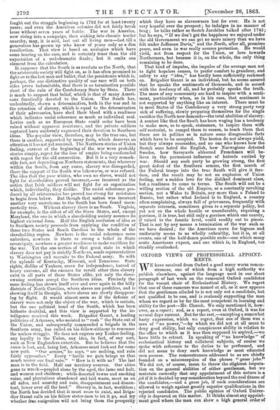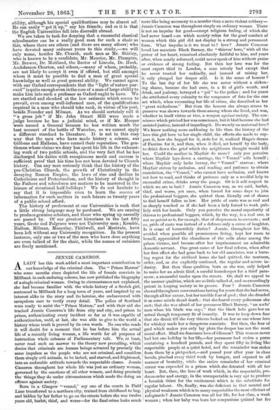OXFORD VIEWS OF PROFESSORIAL APPOINT- W remon- strances, have received
from Oxford a good many warm one of which from a high authority we publish elsewhere, against the language used in our short paragraph of last week on the rumoured Oxford candidates for the vacant chair of Ecclesiastical History. We regret that one of these rumours was named at all, as it now appears that the gentleman alluded to is not only not a candidate, but not qualified to be one, and is zealously supporting the man whom we regard as by far the most competent in. learning and ability for the post—Mr. Church. We only mentioned it, how- ever, as a report; and, as a report, even at Oxford, it was for several days current. But for the rest,—excepting a somewhat hasty expression, which we regret, that one of them was a man of "no power,"—by which we did not at all mean to deny good ability, but only conspicuous ability in relation to the office to which as it was then supposed be aspired,—we have little to retract: In speaking of "no knowledge" of ecclesiastical history and collateral subjects, of course we spoke with reference to the duties to be performed, and did not mean to deny such knowledge as most educated men possess. The remonstrances addressed to us are chiefly founded on a misconception of the phrase "gross jobs." We did not, of course, mean to throw the slightest imputa- tion on the general abilities of either gentleman, but we maintain earnestly that any appointment of this nature is a job if it is decided by any consideration beyond the real fitness of the candidates,—and a gross job, if such considerations are allowed to weigh against greatly superior qualifications in the rejected candidates. The public opinion of Oxford Univer- sity is depraved on this matter. It thinks almost any appoint- ment good where the man can show a high general order of ability, although his special qualifications may he almost nil. He can easily "get it up," say his Mends; and so it is that the English Universities fall into discredit abroad.
We are taken to task for denying that a successful classical schoolmaster can be a really good man for such a chair as this, where there are others (and there are many others) who have devoted many arduous years to this study,—we will only name, besides Mr. Church, such men as Mr. Shirley, who is known to be a candidate, Mr. Maurice, Mr. Plumptre, Mr. Brewer, Dr. Maitland, the Rector of Lincoln, Dr. Hook, Archdeacon Churton, and others,—many of whom, probably, are not likely to accept it even if offered, but still amongst whom it must be possible to find a man of great special knowledge as well as great general ability. We cannot agree with our Oxford correspondents that the "light of nature pur- sued" is quite enough even in the case of a man of large ability to make him into such a professor as Oxford ought to have. We are startled and shocked at the low estimate which seems to prevail, even among well-informed men, of the qualifications required in a man who should take rank, in virtue of his post, beside Neander and Mihnan. As we should certainly call it "a gross job" if Mr. John Stuart Mill were made a judge because he has a judicial mind, or if Mr. Hooper were named a General because he has written much the best account of the battle of Waterloo, so we cannot apply a different standard to literature. It is not in this easy way that the men who have made history a science, our Gibbons and Hallams, have earned their reputation. The gen- tleman whose claims we deny has spent his life in the exhaust- ing work of two public schools, and the very fact that he has discharged his duties with conspicuous merit and success is sufficient proof that his time has not been devoted to Church history. Can any man seriously think that the history of the pre-Christian Church, the growth of Christianity in the decaying Roman Empire, the laws of rise and decline in Catholicism and Protestantism, and the history of thought in the Fathers and schoolmen are matters to be mastered in the leisure of oecasional half-holidays ? We do not hesitate to say that it is impossible even to learn the sources of information for such matters in such leisure as twenty years of a public school afford.
The history of preferment at our Universities is such that a little strong language may be pardoned. We are ceasing to produce genuine scholars, and those who spring up casually are passed by. Of our greatest historians in the last fifty years, Grote and Palgrave were not University men ; Kemble, Hallam, Milman, Macaulay, Thirlwall, and Merivale, have been left without any University recognition. In the present instance, only one or two of the men who have done anything are even talked of for the chair, while the names of outsiders are freely mentioned.































 Previous page
Previous page